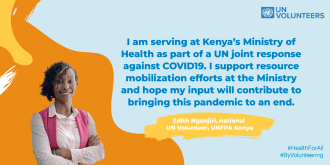Over the last few months, the Coronavirus pandemic, COVID-19, has emerged as the defining global health crisis of our time. COVID-19 is having an unprecedented impact on almost all countries across the world, spreading exponentially like a wave. But COVID-19 is much more than a health crisis. The pandemic has the potential to create devastating social, economic and political crises with far reaching consequences. As COVID19 cases accelerate in Africa, the United Nations has stepped up joint response efforts.
On March 20th in Kenya, the the Government of Kenya, United Nations and International Community convened in Nairobi to join forces in the fight against the COVID-19 pandemic in Kenya.
Siddharth Chatterjee, the UN Resident Coordinator to Kenya, aligned with the UN Secretary General’s call to action on the pandemic and promised to rally the United Nations Country Team in Kenya and mobilize full support to the Government of Kenya in its fight against the virus on all fronts. “This crisis can only be solved through partnerships and we stand with the Government of Kenya and its people to fight COVID-19 in Kenya,” he said.
Fortunately, the UN System in Kenya had already established a joint platform for health to support the implementation of Kenya’s Big Four agenda in order to accelerate the attainment of the Country’s Vision 2030. Under the leadership of the Government of Kenya, the UN System in Kenya established the Sustainable Development Goals (SDG) Partnership Platform in collaboration with development partners, private sector, philanthropy, academia and civil society including faith-based stakeholders.
The Platform was formally launched by the Government of Kenya at the UN General Assembly in 2017 and has become a flagship initiative under Kenya’s UN Development Assistance Framework 2018-2022. Primary health care was established as the first window providing a critical driver for achieving Universal Health Coverage in line with the SDG3 framework.
More than 70 United Nations personnel have been seconded to directly support the Kenyan government’s COVID-19 response efforts. Among these are UN Volunteers, who share their stories of working at the frontlines of the response.
Betty Mugambi is one of the UN Volunteers serving as part of the UN joint platform for health through the United Nations Resident Coordinator’s Office in Kenya. She is based at the Frontier Counties Development Council as a Health Systems Strengthening Specialist.
The Council is a regional economic bloc in Kenya consisting of 10 member counties, namely: Isiolo, Garissa, Lamu, Marsabit, Mandera, Samburu, Tana River, Turkana, Wajir and West Pokot, established in 2014, with the objective of addressing cross-cutting challenges and exploiting development opportunities across these counties.
As COVID-19 escalates in Kenya, UN Volunteer Betty Mugambi has been working tirelessly with the County Executive Committee Members for Health in 10 counties to help in preparedness and response planning. She has been supporting the council's COVID-19 Emergency Response Team with administrative, communications, logistical and co-ordination, particularly developing timely health messaging, case management and resource mobilization.
Peris Njibu, a UN Volunteer with the United Nations Population Fund (UNFPA), also serves as part of the UN Joint Platform for Health at the Council of Governors, an umbrella network for the governors of the 47 counties in Kenya.
As the COVID-19 pandemic outbreak intensifies in the country, UN Volunteer Peris Njibu is helping facilitate and coordinate timely gathering and dissemination of critical information in the 47 counties. She is lobbying support from partners and stakeholders to enhance county level preparedness, particularly in terms of case management, training of health workers and infection prevention interventions.
Edith Ngunjiri is also a UN Volunteer Public Health practitioner with UNFPA and serves at the Ministry of Health. In the early stages of COVID19 preparedness, she supported the Department of Disease Surveillance and Epidemic Response in drafting COVID-19 Kenya status updates and key messages for the Ministry’s website and social media channels.
She is currently helping with planning, coordination and documention of engagements between the Ministry and partners in the public and private sector, including UN entities, on COVID-19 preparedness and response.
Through the SDG Partnership Platform, UN Volunteer Edith Ngunjiri is supporting resource mobilization efforts feeding into the National Task Force subcommittee for resource mobilization. To streamline COVID-19 information systems, she is establishing a database of relevant COVID-19 information, including relevant guidelines, research papers and country experiences. Considering the emerging negative impact of COVID-19 on women and girls, she plans to monitor changes in sexual and reproductive health and rights indicators, then identify and escalate areas of support.
Edwin Opwora, a UN Volunteer with UNAIDS in Kenya, is also part of the COVID-19 UN team embedded with the Kenyan government. He is based at the office of the government spokesperson, and tasked with collecting and disseminating timely, accurate and reliable information on COVID-19.
"We started off by developing a communication strategy; basically, a tool to guide our approach and key messages for dissemination," Edwin shares.
As we were developing the communications strategy, I noticed that vulnerable populations, including people living with HIV/AIDs, were not included. With support from UNAIDS colleagues, we revised to ensure that vulnerable and disadvantaged population groups were also targeted in our communication strategy. -- Edwin Opwora, UN Volunteer with UNAIDS
Edwin volunteered to join the digital communications group, developing digital content and monitoring social media for fake news, myths and misconceptions. He also responds to frequently asked questions from the general public. Edwin noted that initially, there was a lot of confusion because the public didn’t have enough information about the Coronavirus. However, with consistent dissemination of the right information, more Kenyans have become increasingly aware of the basic guidelines given by the government.
Winnie Wachiuri is also a UN Volunteer with UNAIDS, serving as a programme officer.
I am seconded to the Emergency Operations Center at the Ministry of Health to support data management and contact tracing. I mainly support evidence-based approaches to manage the COVID19 outbreak, and hope my inputs will contribute to containing and managing this pandemic. --Winnie Wachiuri, UN Volunteer with UNAIDS

